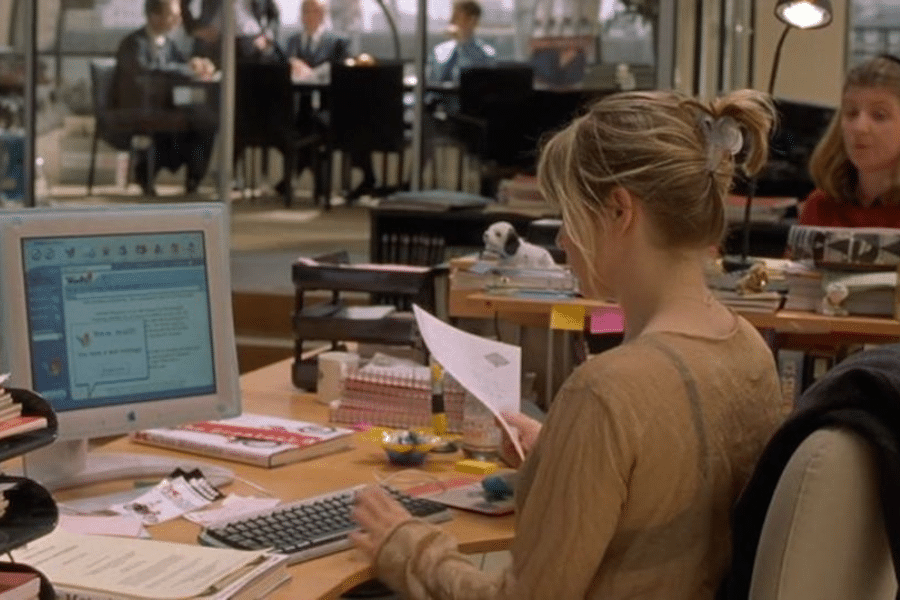
“All I do is copy and paste the same emails, take three to four calls a day, take my extra long break, take more breaks, AND get a nice salary,” reads a woman’s TikTok post, depicting her sitting at her desk swivelling the camera around with a sly smile on her freshly glossed lips and a pristine pink manicured hand resting on the keyboard. What she’s documenting has come to be known as The Lazy Girl Job, a new anti-work, anti-hustle culture trend to take off on the app with 18.5 million hashtag views and counting.
The Lazy Girl Job is essentially one wherein you’re being paid to do the bare minimum. It’s low-stress, won’t have you working outside of the 40-hour work week, and comes with a good, liveable salary. Most of the jobs women describe are fully remote with little oversight: “This is your sign to get you a lazy girl job where 90% of it is just copying and pasting stuff, you’re able to watch TV while you work, and you’re able to wear athleisure,” reads one person’s post. Though typical Lazy Girl Job examples show women working at a computer, the trend could also apply to work environments that aren’t about climbing (or, at least, appearing to climb) the corporate ladder in any way: working at a local cafe where you sip iced lattes all day and gossip with regulars; sitting at the checkout at an independent bookstore reading the latest Emma Cline novel – for your job!
The Lazy Girl Job can be lumped in with other minimum-effort lifestyle trends, like ‘girl dinner’ (eating snacks instead of meals) and ‘bed rotting’ (the terrifying name bestowed to the practice of lying in bed for a long period of time, sometimes days, while binge-watching TV, eating and scrolling social media). But, beyond just promoting doing the least, the growing aspirations for a job that allows its employees to clock off come 5pm and begin work no earlier than 9am feels revolutionary for those who've spent their entire working lives feeling as though they need to live to work, not work to live. The capitalist society we live in profits off us staying longer than we’re paid to at the office and uses barriers to entry to create competition between anyone who isn’t a straight, white male. (There’s a reason this trend is gendered toward women: because it seems it’s not quite so novel for men to imagine being paid more to do less).
A supposed anthesis to this phenomenon came along during the 2010s’ Girl Boss era, which crashed and burned when it came to light that many of the women celebrated for being at the top were not only mimicking the (straight, white male) CEOs who came before them but were adding sprinklings of gaslighting and gatekeeping along the way. Millennial burnout soon ensued. But this careerist culture is still so engrained in us that a recent article by The Cut detailed employees were too nervous to actually properly take a holiday – or turn their out-of-office response on – during their scheduled annual leave. If they ever got around to sending their boss the time off request, that is. In America, almost half of those lucky enough to have PTO (paid time off) take less time off than they’re entitled to, and while out of office, the majority still work.

It’s no wonder Gen Z — overwhelmingly the group leading The Lazy Girl Job charge — has been publicly rebelling against last decades’ hustle and grind culture, disillusioned by the capitalist promises elder generations have sought. Instead, they’re promoting an anti-work, anti-ambition lifestyle, looking for ways to increase their enjoyment and decrease the effort required. The Quiet Quitting and Act Your Wage trends came about at the same time as studies showed just 49% of Gen Z say work is central to their identity, in comparison with 62% of millennials. “Realising at this age that I don’t care about building a ‘career’ or climbing the corporate ladder,” reads one Lazy Girl Job poster. “All I want to do is make the most amount of money working the least amount of hours so I can spend the majority of my time with my family living life on my own terms.” Gen Z champions the idea that there is no point in putting all your effort into work if it leaves you with no time or energy for fun.
Having a Lazy Girl Job is, of course, a privilege. It’s often those who are well educated and who have access to a home environment conducive to work who are afforded these positions. Doing lower-paid jobs, such as manual labour and working in many retail or hospitality spaces, are still very much under strict managerial and public scrutiny. It also pays to note, almost all of those who post about the incredible set-up they have at their Lazy Girl Job fail to reveal what it is exactly that they do, leaving those in the comments desperate to get in on the action often falling flat at finding out how. Elsewhere, career experts are warning of the dangers of promoting a lazy lifestyle: being laid-off for not overperforming, warning of old school bosses who favour those they see in-person at the office, and noting companies probably won't be stoked to see their employees TikToking about doing the bare minimum from their couch.
But while some of these videos show women getting midday blow waves and manicures (where do we sign up?), for the most part, lazy girl jobs aren’t actually lazy at all. Those who are posting are highlighting having boundaries when it comes to work – doing what they’re paid for and ignoring the societal expectations to stay late at the office, or check emails out of hours. In many ways, Lazy Girl Jobs being dubbed ‘lazy’ at all runs in a similar vein to the backlash around quiet quitting: it's just another way to blame people for expecting decent work conditions.
“It is not lazy to expect a job that pays you well, gives you a good work-life balance and doesn’t overwork you,” says one TikTok creator, after detailing her flexible, well-paid job, which she gets done in a normal 40-hour work week. She then goes on to point out that in Europe — a continent that famously shuts down for the month of August so everyone can vacation, and has countries where it’s not only normalised, but encouraged to take afternoon naps (siestas) each day — "this is very normal. There they would find it weird to work more than 40 hours," she explains. "They would find it odd to not take a month of paid time off every year.”
At the heart of it, a Lazy Girl Job seems to be about thinking of how to work smarter, not harder, and showing others it's okay not to have dreams that are made up of career milestones. Now, shall we begin rallying for a month-long, country-wide summer holiday, sì?



